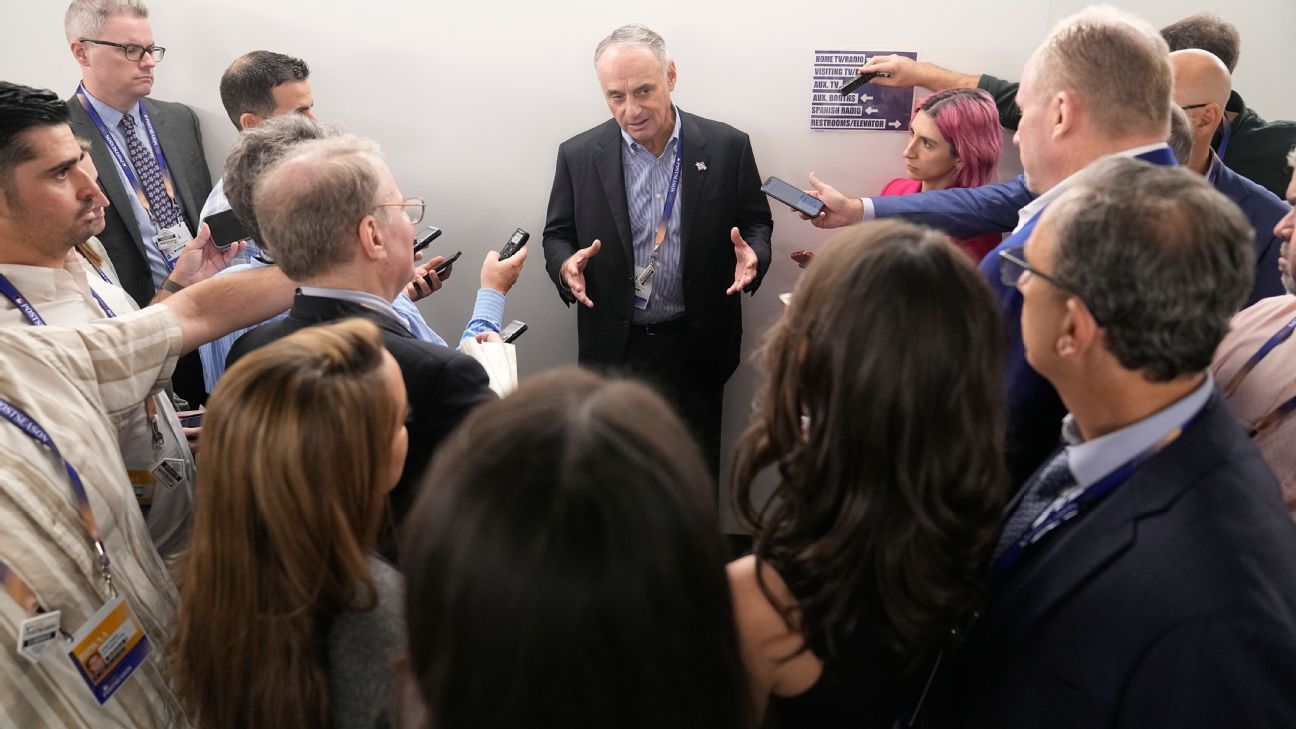
ARLINGTON — While MLB commissioner Rob Manfred is willing to discuss and evaluate the league’s new playoff format, now two years old, his overall view is that it’s been a good thing for baseball. But Tony Clark, executive director of the Major League Baseball Players Association, isn’t as convinced.
The topic came up before Game 1 of the World Series, which pits the 84-win Arizona Diamondbacks against the 90-win Texas Rangers. All three 100-win teams — the Baltimore Orioles, Los Angeles Dodgers and Atlanta Braves — were eliminated in the divisional round.
“This went a little bit different than last year,” Clark, speaking Friday, said of the playoff upsets. “We’ll see how things continue to manifest themselves moving forward. But I’ll say this: At the outset, the interest by the league was a 14-team playoff. Our players were very cautious, both because there may be unintended consequences but, secondly, because they wanted to make sure that over the course of 162 [games], there was value still given to the division winners.”
Manfred pushed back on that notion, emphasizing the beauty of unpredictability come October. Last season, the final four teams left in the playoffs included two wild-card teams and two division winners. This year, three wild-card teams were among the final four, with only Houston making it to the league championship series as a division winner.
“One of the greatest things about the playoffs in baseball is anybody can win,” Manfred said Friday. “It’s about the competition that takes place in the postseason. I don’t think what happened this year is all that out of line with history. Since 1980, only 11% of [100-win] teams have won the World Series. That’s how baseball playoffs are, and frankly how I think they should be.”
The union’s worry is about teams doing just enough to get into the postseason instead of working harder to win their division. The latter goal usually means a higher payroll.
“We came into that negotiation believing that the system wasn’t broke — the 10 teams,” Clark said. “Players, over the course of those conversations, were willing to go to 12, and so, yes, we made 12-team proposals during the course of that negotiation and all of them were premised on ensuring that the team that won the division over the course of the long run was put in a position that respected and appreciated that.”
The union proposed a longer division series as a way to potentially allow division winners to prevail. The best-of-five format has produced multiple upsets over the first two years of the new format. The MLBPA also suggested division winners who play in the best-of-three wild-card round start the series up 1-0.
“The proposals we made included putting the division winners in a place where they didn’t have to win as many games to advance,” Clark said.
Manfred is well aware of the conversation surrounding the playoff format, indicating recently that it’s still too early to draw conclusions. But that doesn’t mean there won’t be discussions this offseason.
“It will at least motivate a conversation about whether we have that right,” Manfred said. “That conversation will take place post the season. Enough has been written and said that we have to think about it and talk about it, but my own view is the format served us pretty well.
“If the die was cast, meaning, ‘If I win 100 in the regular season I’m going to win the World Series,’ I don’t think that’s as interesting as what we’ve witnessed over the last month.”
Manfred also addressed the league’s attempt to develop a baseball capable of providing a good grip for pitchers without allowing them to overly manipulate the ball. They’re still working on it.
“Our progress on the baseball has been a C-minus,” he said. “You’re trying to find that sweet spot between better grip for the pitchers without dramatically increased spin rate. Thought we had a pretty good model last year, but it got gummy when it got hot. We had a good conversation with Japanese professionals about what they’ve done with their baseball. Hoping that will move us forward.”












